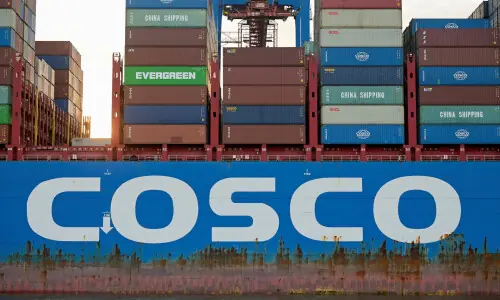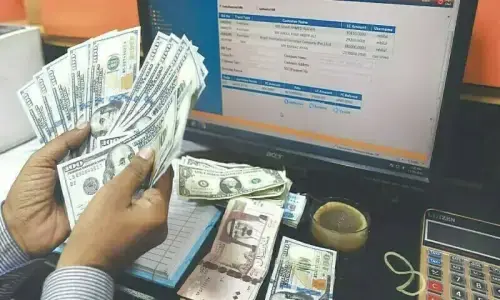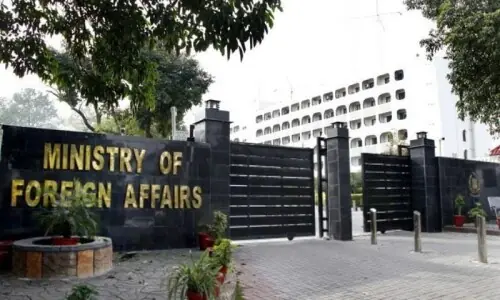The successful privatization of KESC is yet another feather in the Privatization Commission's cap (PC).
It has been a well emphasized part of the five year agenda of the Musharraf government to reduce subsidies to public sector enterprises and to help put them on their feet through structural reforms and implementation of good corporate governance.
The government which had 98 per cent shareholding in KESC diluted roughly 9.45 billion shares (73per cent) out of a total of 12.70 billion shares to a consortium led by Kanooz Al-Watan of Saudi Arabia. As announced, 10per cent of these shares will be offered to employees and workers, whereas the government will keep the remaining shareholding of nearly 26per cent.
The Kanooz Al-Watan group tendered Rs15.856 billion for 73per cent of KESC's shareholding thereby converting a state-run organization into a foreign controlled and managed corporation.
This translates into a per share price of roughly Rs1.65, sold at a discount of Rs1.85 from the book price of Rs3.50. Due to obvious reasons, the share has been trading at a nominal average 52-week price of Rs8.16 based on weeks ending on February 07, 2005 on the KSE.
The new owners cannot sell any part of their shareholding for six years. Kanooz has also committed to inject Rs4.23 billion as preference shares for KESC's turnaround, bringing the total bid price to Rs20.24 billion.
Of the state-run corporations, KESC had been undoubtedly the worst hit, facing negative gross margins for the last five years at least. Costs of producing electricity for the corporation had always been higher than revenues from sale of electricity.
This has been happening due to widespread theft and pilferage of electricity, transmission and distribution losses, highly outdated plant, machinery and transmission facilities, power outages, load shedding, low connected customer base and high provisioning of doubtful receivables year on year. KESC's lackluster performance in these areas over the last three years is given in Table.
As at fiscal year end 2004, Transmission and Distribution Losses (TDL) of the company stood at 37.80per cent, the useful life of the plant and machinery had been depreciated to the extent of nearly 60per cent, and KESC had lost profits of nearly Rs3.6 billion in three years due to write-offs against provisioning of doubtful debts.
In 2004, the company further kept Rs2.25billion as provisions against doubtful receivables, so much so that the total provisioning against doubtful debts stood at a hefty Rs8.93 billion.
Provision for doubtful debts as a percentage of pre-provisioned trade debts stood at an alarming 50per cent. It is expected that a major portion of these receivables were against the general consumers accounting for nearly 70per cent of total pre-provision adjusted trade debts.
The GoP took major initiatives in reviving KESC. Of these, major steps included (1) Heavy subsidies of Rs17.572 billion (2004: Rs9.572 billion, 2003: Rs8.0 billion), (2) Resolution of WAPDA mark-up dispute by recognizing Rs2.25 billion in mark-up on outstanding dues, (3) Fresh equity injection of Rs65.34 billion in 2003 to raise GoP shareholding, (4) Equity write-off of Rs57.2 billion to bring accumulated losses down from Rs66.48 billion in 2002 to Rs17.592 billion in 2003 bringing the book value of the share down from Rs.10 to Rs.3.50 per share, (5) Arrangement of interest-free loans from state-owned oil and gas companies amounting to Rs6.953 billion, (6) Interest-free GoP loan of Rs9.203 billion, (7) Rs6.08 billion as funds proposed to be converted into equity, and (8) Specific grants from GoP, standing at Rs1.078 billion in 2003 and Rs1.508 billion in 2004 by utilizing funds available from the Public Sector Development Program (PSDP).
In its annual report, KESC has projected to lower Transmission and Distribution Losses from 37.80per cent in 2004 to 35per cent by 2005 and 24per cent by 2007. To achieve this, GoP had started implementation work on Project for System Improvement and Reduction of T&D Losses in June 2003.
This plan envisages an investment of Rs13.698 billion, and will be completely implemented by June 2007, in line with the vision to reduce T&D Losses to 24per cent by then. In this regard, the GoP had agreed to provide funds for the project out of PSDP and has disbursed Rs2.60 billion to date.
The capital outlay will be in four major areas namely (1) Restoration of generation capacity costing Rs750 million (5.47per cent), (2) Transmission system stability costing Rs6.358 billion (46.42per cent), (3) Establishment of Supervisory Control And Data Acquisition (SCADA) system costing Rs2.40 billion (17.52per cent), and (4) Schemes for theft reduction costing Rs4.2 billion (30.58per cent).
It is pertinent to note that nearly one third of these funds are to be directed towards schemes for theft reduction, as it is widely accepted that theft and pilferage of electricity is a major contributor to overall T&D losses.
Also commendable is the establishment of SCADA system, which will help to bring significant reduction in error billings as provisioning for bills pending correction alone amounted to Rs750 million in 2004 up seven-folds over the corresponding period of last year.
The role of GoP with regard to further availability of funds from the PSDP is still unclear. However, the Kanooz Al-Watan consortium has entered into an agreement with Siemens Pakistan to act as a technical partner in reviving the corporation.
Other parties/consortium of parties submitting Expression of Interest (EOI) to the PC included ABB (Pvt) Ltd, USA-Pakistan, Corner Stone Partners LLC, USA, Hasan Associates (Pvt) Ltd Consortium, Al Bayarak Al Baida Co, Kuwait and IOSKOM, Turkey, and Independent Power Corporation PLC, UK.
The fact that Al-Kanooz out-bids these highly acclaimed international corporations is a reassuring factor for the credibility, financial and technical strength of the consortium.
In view of these exorbitant cost figures discussed at length above, the consortium's bid of Rs20.24 billion is quite under-rated. Sustaining and subsidizing the annual losses of KESC year on year is a sunk cost for the GoP that cannot be compensated into the bid price of the corporation.
The proposed privatization of KESC had been on the table for the last several years, but due to several reasons, the implementation of this plan seemed difficult. This delay has cost the government to the tune of Rs95-100 billion over the last three years in the form of subsidies, GoP grants, interest-free loans, and quasi-equity.
Furthermore, year after year provisioning of doubtful receivables has exacerbated this cost. If we build these costs into the valuation model for KESC, the GoP is just left with a sigh of relief for possible revival of the "ongoing business concern" status of the corporation.
| Table | ||||
| 2002 | 2003 | 2004 | ||
| T&D Losses | 41.11% | 40.78% | 37.80% | |
| Depreciated life of plant & machinery | - | 55.48% | 58.85% | |
| Depreciated life of T&D network | - | 35.92% | 38.28& | |
| Provisioning of doubtful receviables (Rs Billions) | 7.791 | 7.638 | 8.930 | |
| Provisions during the year (Rs Billions) | 1.071 | 2.008 | 2.249 | |
| Write-off aganist provision (Rs Billions) | 0.516 | 2.161 | 0.957 | |
| Gross loss margin | 25.96% | 29.22% | 12.18% | |
| Net profit margin | -59.62% | -25.61% | 2.96% | |

































